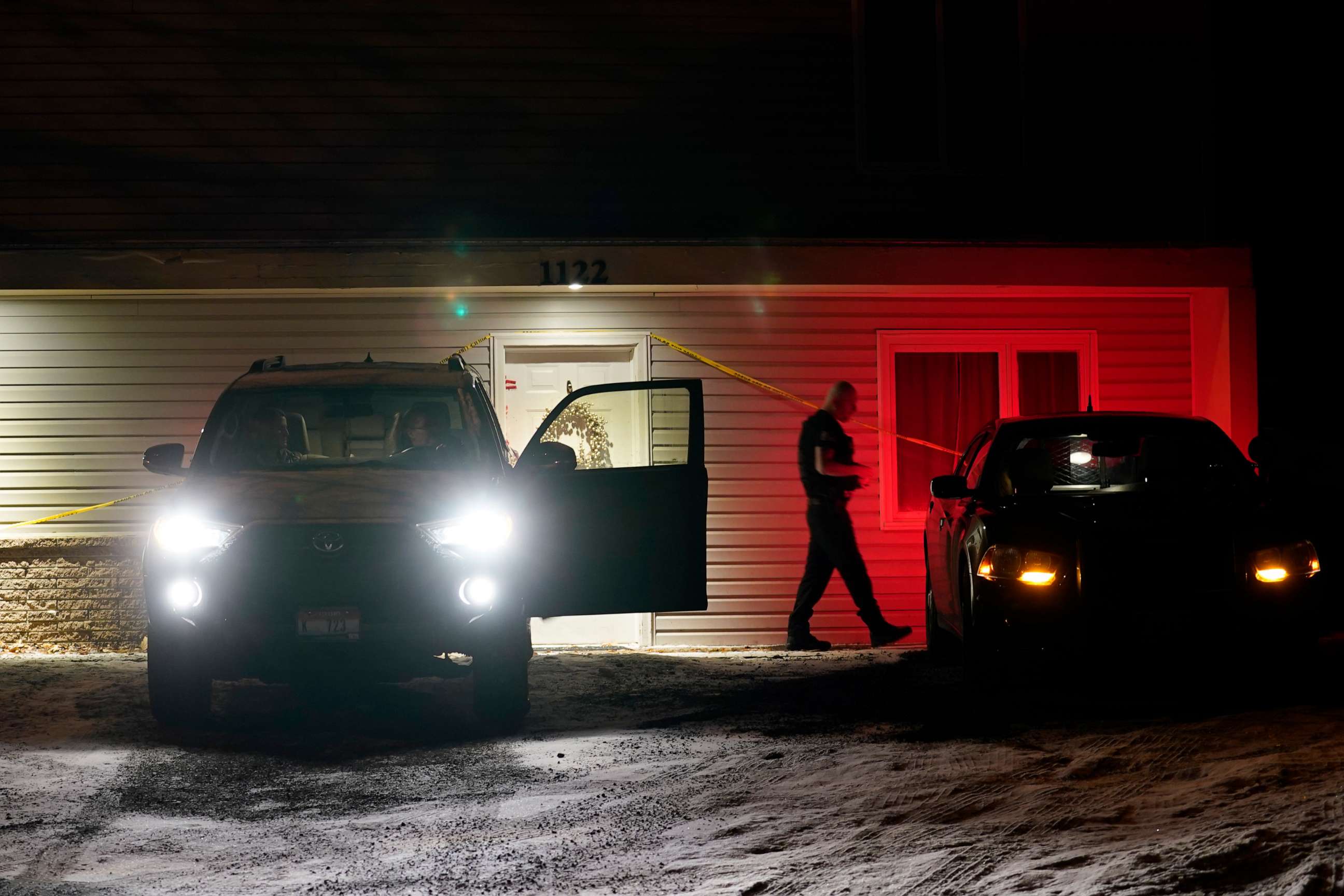
Bryan Kohberger, the 28-year-old suspect, is back in Idaho to face charges.
January 5, 2023, 3:21 PMBryan Kohberger, who is accused of killing four University of Idaho students, is escorted to an extradition hearing at the Monroe County Courthouse in Stroudsburg, Pa., Tuesday, Jan. 3, 2023.
Matt Rourke/AP, PoolA roommate who survived the quadruple murders at the University of Idaho told police she saw a man in black clothes and a mask walking past her in her house on the night of the killings, and she stood "frozen" and in "shock," according to newly released court documents.
The roommate said she didn't recognize the man, who walked toward the back sliding glass door at her off-campus home in Moscow, Idaho, according to documents released on Thursday. She locked herself in her room after seeing him, the documents said.
Other chilling details revealed in the court documents include that the suspect's phone was near the victims' house at least 12 times before the murders, at least as far back as August, but his phone was off when the murders unfolded.
Two roommates, who police said are not suspects, survived the attack in the early hours of Nov. 13. Later that morning, the roommates called friends over to their house because they thought one of the victims on the second floor had passed out and wasn't waking up, police said. Around noon, a 911 call from one of the roommate's phones requested help for an unconscious person, police said.
Responders found University of Idaho students Xana Kernodle, Kaylee Goncalves, Madison Mogen and Ethan Chapin all stabbed to death.

The mysterious slayings went unsolved for weeks and garnered national interest. The 28-year-old suspect, Bryan Kohberger, was arrested in his home state of Pennsylvania on Friday and was extradited to Idaho on Wednesday.
Here's what we learned from the court documents:
DNA from the suspect was recovered on a tan leather knife sheath left on Mogen's bed, according to the documents.
On Dec. 27, police recovered trash from Kohberger's parents' house in Pennsylvania, and a lab then determined that the DNA from the trash was the father of the person who left DNA on the knife sheath, the affidavit said.
A shoe print believed to be from the intruder was found outside one of the survivors' rooms, the affidavit added.
Police believe the murders unfolded between 4 a.m. and 4:25 am., according to the court documents.
Kernodle got a DoorDash order at the house at about 4 a.m., according to the affidavit.
One of the surviving roommates said she woke up around 4 a.m. from what sounded like Goncalves playing with her dog in one of the third floor bedrooms, according to the affidavit.
"A short time" after, the roommate said "she heard who she thought was Goncalves say something to the effect of 'there's someone here,'" the documents said. But that could have been Kernodle on her phone because records showed she was on TikTok at about 4:12 a.m., the affidavit said.
The roommate said "she looked out of her bedroom but did not see anything when she heard the comment about someone being in the house," the documents said. "She opened her door a second time when she heard what she thought was crying coming from Kernodle's room."
The roommate "then said she heard a male voice say something to the effect of 'it's ok, I'm going to help you,'" according to the documents.

The roommate said she opened her door again when she heard the crying, and that's when she saw the figure in the mask, the documents said.
She described the intruder as 5-foot-10 or taller, and "not very muscular, but athletically built with bushy eyebrows," according to the documents.
At about 4:17 a.m., a security camera less than 50 feet from Kernodle's room picked up sounds of a barking dog and "distorted audio of what sounded like voices or a whimper followed by a loud thud," according to the documents.

After the victims were discovered, authorities reviewed surveillance video from the area and saw the suspect's white Hyundai Elantra go by the victims' house three times, before entering the area for a fourth time at 4:04 a.m, according to the documents.
Police said they traced the car's travel that night back to nearby Pullman, Washington, where the suspect lived while attending Washington State University.

Kohberger was a Ph.D. student in Washington State's department of criminal justice and criminology at the time of the murders. Washington State's campus is less than 10 miles from Moscow, Idaho.
Moscow police asked law enforcement to look out for white Elantras, the affidavit said, and on Nov. 29, a Washington State University police officer searched cars that matched that description at the university and found one registered to Kohberger.
Kohberger registered his white Elantra in Washington state on Nov. 18 -- five days after the murders -- and received a new license plate, according to the documents. The car had previously been registered in Pennsylvania and his Pennsylvania plate was set to expire on Nov. 30.
Kohberger's phone was tracked heading to Moscow before the attack and as the driver of the white Elantra returned to Pullman. However, the phone was off from 2:47 a.m. to 4:48 a.m., which "is consistent with Kohberger attempting to conceal his location during the quadruple homicide," the document said.
His phone was near the victims' house at least 12 times before the murders, at least as far back as August, the document said. All of those times, except for one, were late at night or early in the morning.
The morning after the murders, he went near the house between 9:12 a.m. and 9:21 a.m., the documents said, citing cellphone data.
Police said they learned Kohberger applied for an internship with the Pullman police in the fall of 2022, and in an essay he said he wanted to help "rural law enforcement agencies with how to better collect and analyze technological data in public safety operations," the affidavit said.
"Kohberger also posted a Reddit survey which . asked for participants to provide information to 'understand how emotions and psychological traits influence decision making when committing a crime,'" the affidavit said.